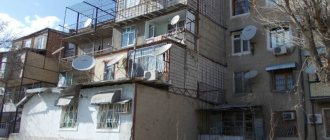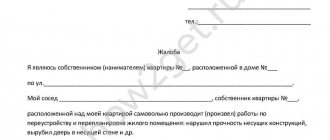Grounds and conditions
You can evict unwanted tenants living in a communal apartment, but only by court decision, if there are good reasons for doing so.
In order to expel those who occupy living space in a shared apartment, the following grounds must exist :
- systematic violation of the rights of other people living nearby (drunken brawls, noise and commotion at night, the constant presence of a company of inappropriate citizens, fights, etc.);
- use of living space other than for its intended purpose (for breeding animals, storing materials, setting up the production of any items, etc.);
- causing damage to the home - when walls are dismantled, windows and doors are removed, floors are damaged - in fact, the home is destroyed;
- failure to pay rent and utilities for several months;
- unsanitary conditions;
- violation of fire safety standards and regulations;
- violation of contractual terms of residence, etc.
Read about the grounds for eviction of the owner, as well as registered and unregistered persons on our website.
Any grounds must be confirmed by papers - police reports after a call to the house, acts of residence. offices, appeals to the district police officer, conclusions of the sanitary and epidemiological station, etc.
Eviction is possible under different conditions :
- with the provision of other living space;
- to “nowhere”, that is, without the provision of housing.
Each specific case has a lot of nuances - whether the tenants who are being evicted are on the waiting list for improving housing conditions , whether there are young children, pensioners, disabled people, where they are registered, what legal status they have in relation to the living space of the room in the communal apartment, etc. .
You can read about the grounds for eviction from service housing in our article.
Rules for neighbors living in a communal apartment, rights and relationships
In principle, there are no legally formalized rules for cohabitation, that is, in fact, either residents have to negotiate on their own, or look for any provisions from the codes. The simplest option is, of course, to find a compromise. After all, it is much easier to come to an agreement than to call the police on each other, put up partitions or lock common areas. But compromise is not always possible.
We recommend reading: What documents are needed for burial?
According to the civil code, everyone legally living in a given apartment has the right to use these places, but not a single law can clearly state how exactly they should be used. Theoretically, all these territories should be distributed on a shared basis, but in practice it becomes clear that occupying half a square meter in a toilet for 24 hours is not possible.
Who has the right under the law?
What laws govern it?
Eviction is subject to the requirements of the Housing Code of the Russian Federation under articles: 29, 35, 41, 60, 83, 84, 85, 90, 91, as well as the Civil Code of the Russian Federation (Articles 293, 610, 619, 620, 687).
those whose rights are infringed by a tenant of a communal living space - a neighbor, owner, landlord, lessor, management company or HOA, state housing inspectorate, etc. - have the right to go to court
The accumulation of debts for utilities, for example, will not be considered a reason for neighbors to go to court, but only for living. the office or service providers may be plaintiffs in such a case.
There are legislative acts that also serve to protect the rights of those evicted themselves (Part 2 of Article 83 of the Housing Code of the Russian Federation).
What to do if neighbors in a communal apartment occupy common areas
In my friend’s communal apartment, a neighbor was carrying washing powder.
Funny, but annoying. In our chemical laboratory, he asked for a substance that looked like washing powder, but in fact it was something like bleach. The neighbor once again washed it with this powder and had to throw the things away. I recently saw such a story on TV. Two ladies, bailiffs, divided the MOP centimeter by centimeter and drew chalk lines for the neighbor along which he had the right to walk. They said that if the conflicts did not subside, they would paint them with white paint. :046::015:oh, I would like these aunties)))
Causes
There are all sorts of reasons, but the judge can only take into account the most compelling ones:
- ugly behavior that complicates the life of neighbors, making it unbearable;
- littering of premises common to all residents;
- improper maintenance of common areas;
- more than 6 months no fee is paid;
- using your living space for purposes other than its intended purpose;
- redevelopment that violates the rights of others, etc.
Each of the reasons requires investigation by the authorities competent in this matter and their rendering of a verdict - whether there really is a malicious violation of the rights of the remaining residents.
There are other reasons that do not always depend on the citizens themselves :
- the building where the apartment is located is considered unsafe or subject to demolition;
- the premises are transferred to non-residential stock;
- a major overhaul with complete redevelopment is coming;
- the premises are transferred to another department - for example, a religious organization.
Only a court decision can force people to leave a communal apartment against their will.
Basic rules for living in a communal apartment
- To what extent does the premises comply with the requirements of the legislation of the Russian Federation;
- How will safety for residents be ensured during the repair work;
- What work is planned to be carried out and what are the costs of its implementation;
- How will possible defects be eliminated?
- Using television or radio equipment above the permissible noise level;
- Using musical instruments (guitar, violin, etc.), singing songs, screaming;
- Carrying out repair work on premises using loud-sounding tools and devices;
- Use of pyrotechnics;
- And other activities that contribute to noise pollution.
What kind of housing will be provided in return?
The person being evicted should not count on a mansion; he will be carefully checked to see if he or his other half has a dacha , and will be offered to move there, otherwise they will be evicted to the following places:
- other living space owned by family members;
- to “nowhere,” that is, without providing another roof over your head;
- to another living quarters (if only expelled from the municipal room).
It should be remembered that you need to fight for your rights, so there is no need to take the situation to the extreme and defend yourself: file a counterclaim, obtain testimony refuting the plaintiff’s arguments, as well as documentary evidence of your innocence.
Neighbors in a communal apartment refuse to make repairs to common areas
Hello! In a communal apartment, I made unauthorized redevelopment in favor of my space. The neighbor wrote a statement refusing this UDF area. Accordingly, the calculation of utility bills has changed. Can I now obtain a new certificate of title due to these changes?
QUESTION: Good afternoon! My name is Dmitry. I live with my wife and children in a communal apartment. We have two more neighbors, some live, and others just rent out a room. We are not against renting out a room, but the question comes down to the following: very often something breaks and you have to buy it, for example a gas water heater, and the plumbing leaves much to be desired. We offer our neighbors to make repairs to common areas; we recently received an order from the Housing Office requiring the owners to make repairs to these places once every five years.
Who can't be kicked out?
cannot expel from their home
- orphans, regardless of their age;
- old age pensioners;
- family members recognized as missing or died in the line of duty (firefighters, Emergencies Ministry, military, police, penitentiary service workers);
- disabled people of the 1st and 2nd groups who received disability while performing official or military duty, as well as due to occupational diseases;
- family members of a municipal housing tenant who has passed on to another world.
But not everything is so simple, the listed categories of residents must be registered with the communal apartment, be on the list for improvement of living conditions , that is, in need of it, otherwise they may still be subjected to forced eviction without being provided with another living space.
Neighbors in a communal apartment refuse to make repairs to common areas
Hello! Neighbors in a communal apartment made repairs in the hallway, bathroom and toilet without my consent. The apartment is municipal. Now they are going to sue us so that we reimburse them half the cost of the repairs. The repairs are expensive and I don’t have the money to give them half, what should I do? this situation?
Hello. I live in a 5-room communal apartment, I occupy one room, sometimes I have to make repairs, small things like pipes, or install a water meter, one of the owners does not want to give back the money that I invested for it. Everything was repaired without her consent since she did not respond to SMS and calls. Is it possible to prohibit her from renting out a room? And what documents should I collect to sue her, or can the issue be resolved through pre-trial settlement?
How does the procedure work?
The eviction proceeds according to the following scenario:
- a citizen or legal entity who has the right to go to court collects documents, looks for witnesses and writes a statement of claim to the court;
- the court considers the evidence provided, assesses its weight, listens to the opposing party and makes a decision;
- Having received the court decision (after it enters into legal force), the bailiff will open a case of enforcement proceedings and notify both parties (in writing) of the eviction, and it is important that the defendant voluntarily agrees to leave the living space in the apartment;
- if the defendant is categorical in his intention to stay, that is, to ignore the court order, the bailiff must write out a paper in which he gives the defendant time to move out, otherwise there will be a forced eviction;
- in the personal presence of two disinterested witnesses, is expelled .
There are nuances here: the bailiff cannot simply kick people out onto the street.
He is obliged to write an eviction act, which must be signed by everyone present, from the defendant to witnesses and those whom the bailiff called for help (in case it is necessary to enter the territory by breaking the door, or under other aggravating circumstances), on the basis part 8 art. 107 “Law on sharecropping production”.
You also need to describe in detail what and how much of the property is in the room, and store all these things in a special area, and delivery to this warehouse is also the responsibility of the bailiff.
The goods are not arrested or confiscated , but are simply kept in storage until the expelled citizen finds refuge.
Common areas section
Good afternoon. I live in a communal apartment. The room is 18 sq.m. The room is privatized. 2 more rooms with an area of 11 and 14 sq.m. for social rent from neighbors. I wanted to know how common areas are divided in the kitchen, hallway, etc. The neighbors claim that they have 2 rooms, which means they take up more space. Although Art. 42 talks about division in the fractional part. That is, roughly speaking, our rights to these premises are in a 40/60 ratio. Please clarify this issue.
4. When transferring ownership of a room in a communal apartment, the share in the right of common ownership of the common property in this apartment of the new owner of such a room is equal to the share in the right of common ownership of the specified common property of the previous owner of such a room.










